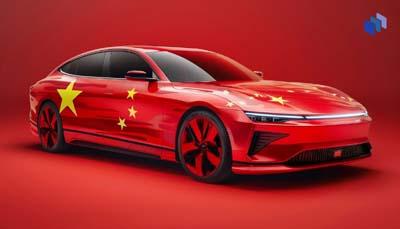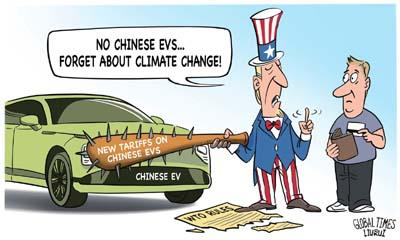
Even higher tariffs cannot protect the US automotive industry
Global Times
According to multiple Western media outlets citing a “person familiar with the plan,” the US government is expected to announce as early as May 14 that it will increase the tariff on Chinese electric vehicles (EVs) from the current 25 percent to 100 percent, and impose new tariffs on other Chinese goods including semiconductors and medical supplies.
The White House declined to comment. The US side is currently reviewing the tariffs on Chinese goods imposed during the Donald Trump era. Chinese new energy products represented by EVs have garnered particular attention. However, it’s generally believed that considering the “almost zero” number of EVs exported from China to the US, even if the new tariffs are implemented, they are unlikely to immediately impact Chinese electric car companies. What the US will do next matters more about a portrayal of its own national reputation.
The US claims it is founded on free trade. Imposing a 100 percent tariff on goods from other countries, regardless of the reasons, is a clear violation of WTO rules and the spirit of free trade. If appealed to the WTO for arbitration, the US will definitely lose the case and face condemnation from the international community. However, many major international media outlets, including those in the US, actually believe that the US would do such a thing based on a few words from the “person familiar with the plan,” which reflects the US’ current global image. If such damaging incidents to international reputation occurred in any other countries, the government would be expected to firmly clarify, but the White House remains silent. All these strange occurrences have become “normal” when it comes to the US, further highlighting the abnormality of the current US policy direction.

The US has been launching a public opinion offensive against China’s new energy industry under the pretext of “overcapacity” for several months, and news of tariff increases has been spreading in waves. Several US media outlets have revealed that there is “serious disagreement” within the US domestic and even government on whether to adjust tariffs, and they are facing opposition from global public opinion. The CEO of Stellantis, the parent company of Maserati, Carlos Tavares, previously said that “I’m not asking for any kind of protection, because anyway, we are a global company, so I will not be protected everywhere.” The Wall Street Journal also pointed out that trying to bar the most affordable electric vehicles from the US market will put pressure on another Biden administration goal: reducing carbon emissions. American analysts, industry unions, and others have warned that this “power game” instigated by Washington will not only harm the US economy but may also provoke retaliation from China.
Some analysts believe that in addition to domestic political considerations, if the US really imposes high tariffs, it also intends to put pressure on the EU at this moment. Some former US government officials also stated that they want to involve developing countries such as Brazil and India with the US to do so. If the US really does this, it will harm the interests of the whole world, not only infringing on the free trade rights of other countries, but also depriving the “Global South” countries of their green development rights, especially considering the contribution of China’s new energy industry to global green transformation, especially to the “Global South” countries.
Looking at it from a different perspective, can high tariffs and trade barriers really protect the US automotive industry? The US steel industry is a case in point. As early as 2017, when the US issued antidumping and countervailing duty orders on imports of stainless steel sheet and strip from China, the Global Times pointed out in an article that China’s steel exports to the US are insignificant, and the root of the US steel industry’s problems lies not in so-called “unfair competition” or lack of sufficient protection, but in its long-standing monopoly position and lack of emphasis on relying on technological progress to improve production efficiency. What the US steel industry really needs is reform through openness, and trade protection will only enhance corporate inertia. Indeed, late last year, the giant company U.S. Steel Corporation, which provided steel for the Empire State Building in New York, accepted acquisition by a Japanese company. Has protectionism indeed protected the US steel industry? Or has it turned into a political bubble? If Washington still wants to replicate the “protection” path, then the fate of the steel industry today may be the fate of the US automotive industry tomorrow.
In fact, there is no lack of good news between China and the US. A meeting of the US-China Working Group on Enhancing Climate Action in the 2020s was recently held in Washington. The US representative John Podesta said that there is no country more important than China and the US to lead us forward. Larry Marshall, the former chief executive of CSIRO, Australia’s national scientific research agency, also said that the world needs a “climate armistice” between the US and China if net zero emissions are to be reached. In fact, American car companies are “looking for electric vehicle allies in China,” and Tesla is a good example. Whether to step into the river of protectionism again or embrace the trend of win-win cooperation, the issue of tariffs on China is a touchstone for Washington.
